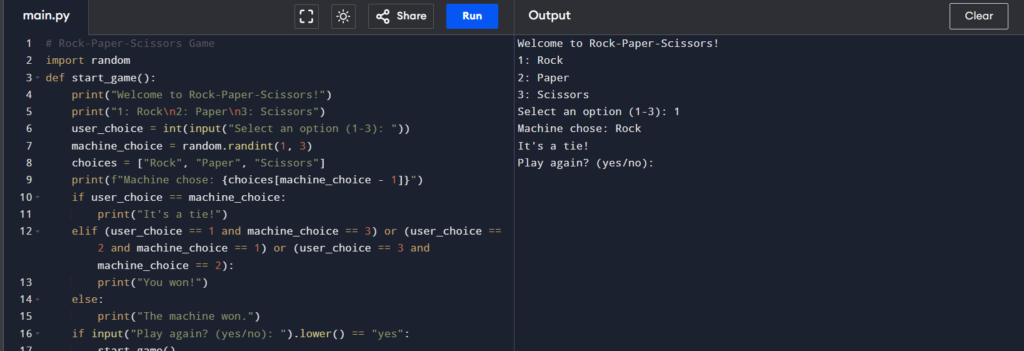Python Random Module
The Python random module is a built-in tool for generating random numbers, making it ideal for creating unpredictability in your programs. Whether you’re simulating dice rolls, choosing a random item from a list, or building a game, the random module has a variety of functions to suit your needs. Here’s an overview of some essential functions and how they can add a dynamic edge to your Python projects.

The random() Function
The random.random() function generates a floating-point number between 0.0 and 1.0. It doesn’t require any arguments, making it a straightforward way to introduce randomness.
# Generating a random float
import random
num = random.random()
print(num)
Output:
0.3232640977876686
The randint() Function
For whole numbers, random.randint() provides a simple way to generate a random integer within a specified range. The beginning and ending of the range (inclusive) are the two parameters that the function takes in.
# Producing an arbitrary integer from 1 to 500
import random
num = random.randint(1, 500)
print(num)
Output:
215
Download New Real Time Projects :-Click here
The randrange() Function
The random.randrange() function is similar to randint(), but it allows for more customization by including a step parameter. This function randomly selects a number from a given range, defined by start, stop, and step arguments. The default values for start and step are 0 and 1, respectively.
# Generating values within a specific range
import random
num1 = random.randrange(1, 10)
num2 = random.randrange(1, 10, 2)
print(num1, num2)
Output:
4
9
The choice() Function
Need a random item from a sequence?Choosing a random element from a non-empty sequence—whether it be a string, list, or tuple—is made simple with random.choice().
# Selecting a random element
import random
random_char = random.choice('Random Module') # from a string
print(random_char)
random_num = random.choice([23, 54, 765, 23, 45, 45]) # from a list
print(random_num)
random_tuple = random.choice((12, 64, 23, 54, 34)) # from a tuple
print(random_tuple)
Output:
M
765
54
The shuffle() Function
The random.shuffle() function is useful when you want to reorder elements in a list. This function randomly changes the order of items within the list, making it a go-to option for shuffling cards or mixing up game elements.
# Shuffling elements in a list
import random
list1 = [34, 23, 65, 86, 23, 43]
random.shuffle(list1)
print(list1)
Output:
[23, 43, 86, 65, 34, 23]
Rock-Paper-Scissors Game Using random
Let’s bring it all together with a simple Rock-Paper-Scissors game that relies on random.randint() for the computer’s choice. This game demonstrates how randomness enhances interactivity in programs.
# Rock-Paper-Scissors Game
import random
def start_game():
print("Welcome to Rock-Paper-Scissors!")
print("1: Rock\n2: Paper\n3: Scissors")
user_choice = int(input("Select an option (1-3): "))
machine_choice = random.randint(1, 3)
choices = ["Rock", "Paper", "Scissors"]
print(f"Machine chose: {choices[machine_choice - 1]}")
if user_choice == machine_choice:
print("It's a tie!")
elif (user_choice == 1 and machine_choice == 3) or (user_choice == 2 and machine_choice == 1) or (user_choice == 3 and machine_choice == 2):
print("You won!")
else:
print("The machine won.")
if input("Play again? (yes/no): ").lower() == "yes":
start_game()
start_game()

random
https://updategadh.com/category/php-project
Additional random Module Functions
The random module also includes various functions to generate numbers and work with sequences:
seed(a=None, version=2): Initializes the random number generator with an optional seed.getstate()andsetstate(state): Save and restore the generator’s state.getrandbits(k): Generates an integer with k random bits.uniform(a, b): Returns a random float within the specified range [a, b].normalvariate(mu, sigma): Generates a random float based on the normal distribution.
- python random randint
- random module in python with example
- python random float
- python random number
- Python Random Module
- random.sample python
- python random number in range
- python random uniform
- Python Random Module
- random module in python pdf
- python compiler
🎓 Need Complete Final Year Project?
Get Source Code + Report + PPT + Viva Questions (Instant Access)
🛒 Visit UpdateGadh Store →